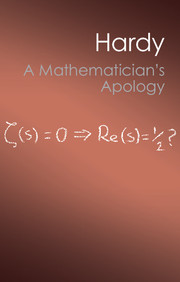17
Published online by Cambridge University Press: 05 August 2014
Summary
The second quality which I demanded in a significant idea was depth, and this is still more difficult to define. It has something to do with difficulty; the ‘deeper’ ideas are usually the harder to grasp: but it is not at all the same. The ideas underlying Pythagoras's theorem and its generalizations are quite deep, but no mathematician now would find them difficult. On the other hand a theorem may be essentially superficial and yet quite difficult to prove (as are many ‘Diophantine’ theorems, i.e. theorems about the solution of equations in integers).
It seems that mathematical ideas are arranged somehow in strata, the ideas in each stratum being linked by a complex of relations both among themselves and with those above and below. The lower the stratum, the deeper (and in general the more difficult) the idea. Thus the idea of an ‘irrational’ is deeper than that of an integer; and Pythagoras's theorem is, for that reason, deeper than Euclid's.
Let us concentrate our attention on the relations between the integers, or some other group of objects lying in some particular stratum. Then it may happen that one of these relations can be comprehended completely, that we can recognize and prove, for example, some property of the integers, without any knowledge of the contents of lower strata.
- Type
- Chapter
- Information
- A Mathematician's Apology , pp. 109 - 112Publisher: Cambridge University PressPrint publication year: 2012



